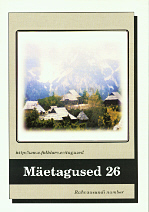Laste maailm 21. sajandil. Muutused ungari traditsioonis
Children's World in the 21st Century: Changes in Hungarian Traditions
Author(s): Katalin LázárSubject(s): Customs / Folklore
Published by: Eesti Kirjandusmuuseum
Summary/Abstract: In a traditional society, games have played an important role. A newborn baby is constantly surrounded by games: its grandparents and elder siblings play with the baby, it learns to pay attention to others, to establish personal contacts, thus playing games helps a young child to become socialized. Next to other possible meanings, the word "game" in the Hungarian language - like in many other languages - has the meaning "not serious". Present-day town children have virtually abandoned traditional games. In former times in villages, children groups were formed of children living close to each other: in present-day towns and cities these groups have been replaced by nursery or kindergarten groups or school classes. In nurseries children learn playing as subject matter of instruction, at school even not in that way. Children are often introduced less traditional games (board games, including chess, for example) and they also know various kinds of building bricks and other construction games, card plays, games of logic; these are played first with parents or later with other children. They know quiz programs from television, and many children (and grown-ups) watch them eagerly. Traditional games can be used at school as well. As to folklore, folk culture, which is not officially taught at schools Hungary, traditional games can be used in history, singing, physical education, mathematics or Hungarian literature and grammar classes.
Journal: Mäetagused. Hüperajakiri
- Issue Year: 2004
- Issue No: 26
- Page Range: 203-210
- Page Count: 8
- Language: Estonian

